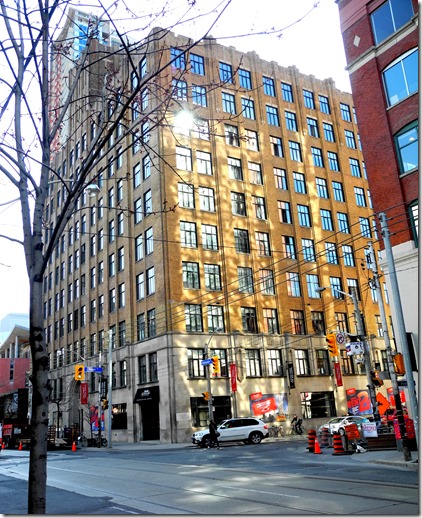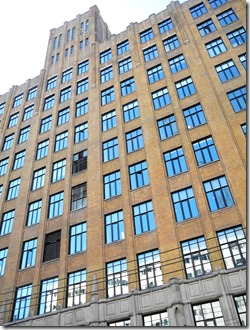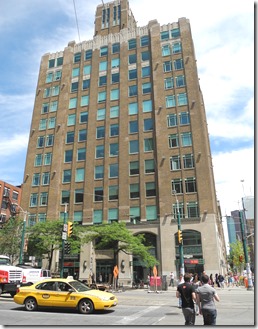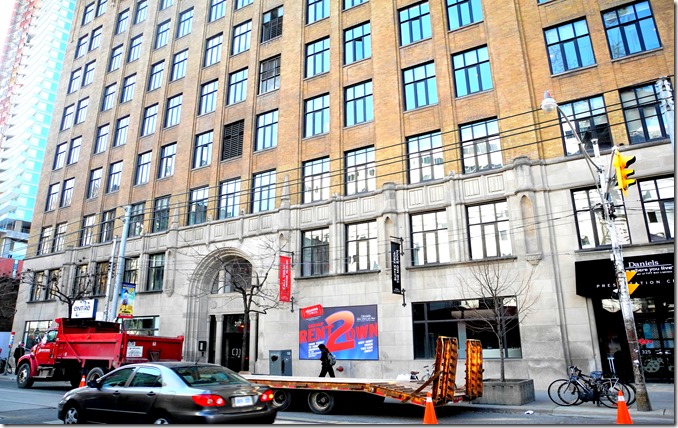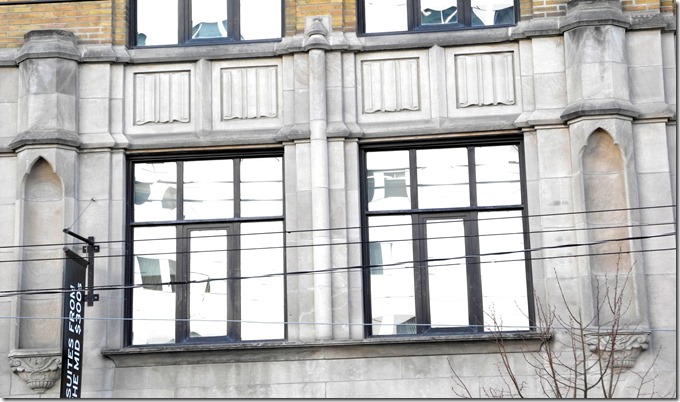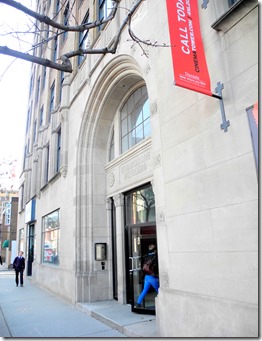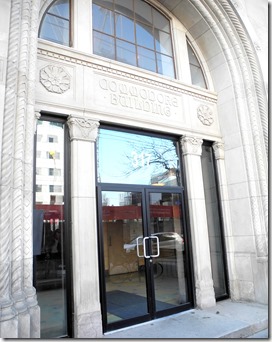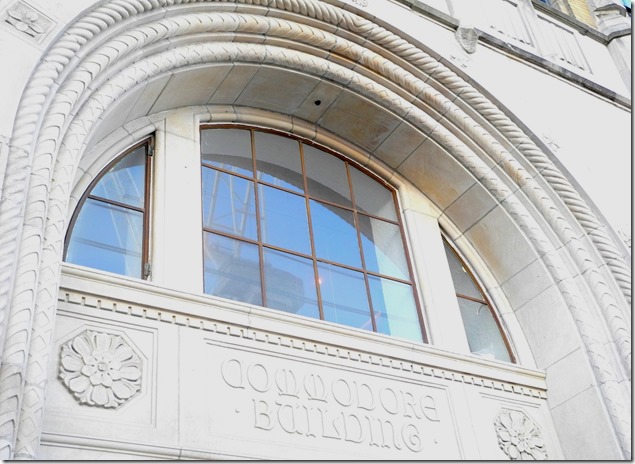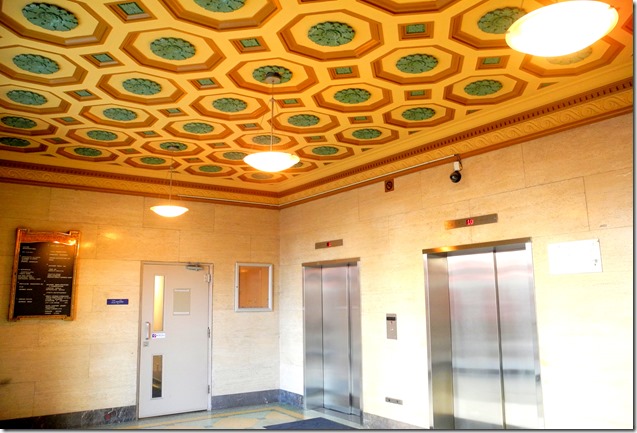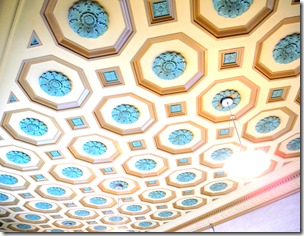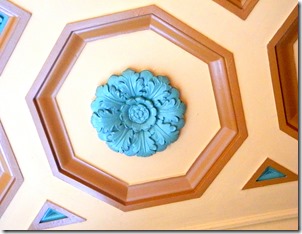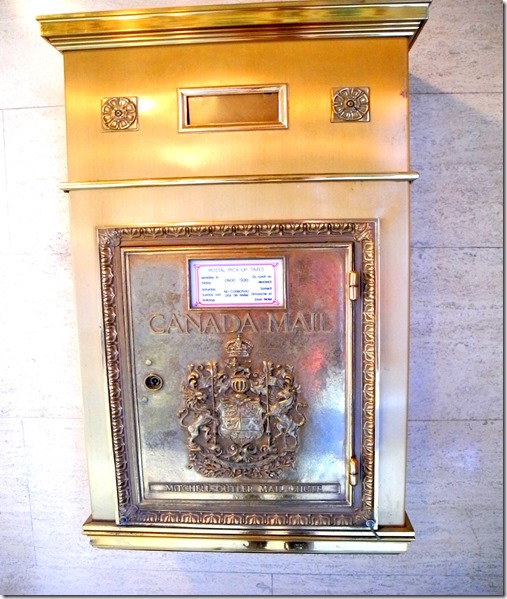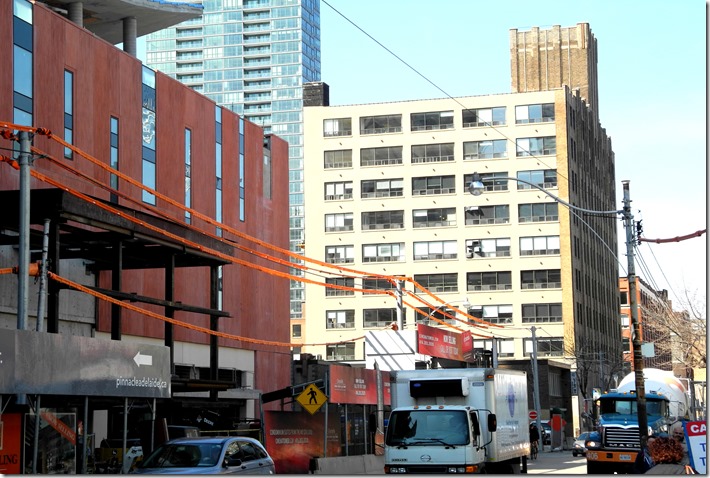The Commodore Building on the north side of Adelaide Street West, between Peter and John Streets, is one of the finest examples of commercial architecture erected in Toronto during the 1920s. Its architect was Benjamin Brown, who also designed the Balfour Building in a similar style. The Commodore Building was completed in 1929, and the Balfour Building a year later, in 1930.
(Above Photos)—The Commodore Building (left) on Adelaide Street and and the Balfour Building (right) at Spadina and Adelaide. The similarities are obvious.
Benjamin Brown was one of the city’s most popular architects during the second decade of the 20th century. He designed nine commercial loft-style buildings on Spadina Avenue between 1920 and 1930, including the Reading, Tower, and Balfour Buildings. He was also the architect for the Standard Theatre at Spadina and Dundas Streets (later renamed the Victory Theatre). He graduated from the University of Toronto’s School of Architecture in 1913 and was a member of the Ontario Association of Architects.
The facades on the north and west sides of the Commodore Building contain many large rectangular windows, constructed with metal frames, which was an innovation for that decade. The cornice of the structure, as well as the two-storey tower (containing the mechanical room), possess Art Deco detailing that add greatly to the simple lines of the facades. It is a building that is impressive when viewed from the street level, but remains human in scale. The yellow (light-brown) bricks are attractive and warm to the eye, contrasting with the white stone trim. Each floor of the 10-storey structure has high ceilings and maple floors. Today, the interior spaces are eagerly sought by companies that wish to have prestigious offices within the historic downtown area.
The impressive two-story base of the Commodore Building, facing Adelaide Street. It has a stone facing, with many interesting details.
Stone detailing above the second storey on the Adelaide Street facade.
Entrance to the building on Adelaide Street
Roman arch above the entrance, with its classical detailing
The lobby with its marble trim and ceiling containing Art Deco designs.
The designs on the ceiling in the lobby.
The brass Canada Post box in the lobby, dating from the 1920s. It remains in use today.
View of the Commodore Building, looking west along Adelaide Street from near John Street. The Cinema Tower Condominium (left side of photo) is under construction to the east of the Commodore Building. Photo taken in May of 2013.
To view the Home Page for this blog: https://tayloronhistory.com/
To view other posts about the history of Toronto and its buildings:
The Graphic Arts Building (condo) on Richmond Street
The Art Deco Victory Building on Richmond Street
The Concourse Building on Adelaide Street
The old Bank of Commerce at 197 Yonge Street
The Traders Bank on Yonge Street—the city’s second skyscraper
https://tayloronhistory.com/2013/05/22/torontos-architectural-gemstraders-bank-on-yonge-st/
Toronto’s old Union Station on Front Street, built in 1884
https://tayloronhistory.com/2013/05/18/torontos-lost-architectural-gemsthe-old-union-station/
St. Andrew’s Presbyterian Church at King and Simcoe Streets.
https://tayloronhistory.com/2013/05/13/torontos-architectural-gemshistoric-st-andrews-on-king-st/
The row houses on Glasgow Street, near Spadina and College Streets
https://tayloronhistory.com/2013/05/10/torontos-architectural-gemsrow-houses-on-glasgow-st/
The bank at Queen and Simcoe that resembles a Greek temple
The cenotaph at Toronto’s Old City Hall
https://tayloronhistory.com/2013/04/09/torontos-architectural-gemscenotaph-at-old-city-hall/
The magnificent Metropolitan Cathedral at King East and Church Streets
https://tayloronhistory.com/2013/04/02/torontos-architectural-gemsmetropolitan-cathedral/
St. Stanislaus Koska RC Church on Denison Avenue, north of Queen West
The historical St. Mary’s Church at Adelaide and Bathurst Streets
The Bishop’s (St, Michael’s) Palace on Church Street, Toronto
https://tayloronhistory.com/2013/03/02/torontos-architectural-gemsbishops-palace-on-church-street/
The Union Building at Simcoe and King Street West
https://tayloronhistory.com/2013/03/30/torontos-architectural-gemsthe-union-building-on-king-st/
The Ed Mirvish (Pantages, Imperial, Canon) Theatre, a true architectural gem on Toronto’s Yonge Street
The Waverly Hotel on Spadina near College Street.
https://tayloronhistory.com/2013/02/16/toronto-architectural-gemsthe-waverly-hotel-484-spadina/
The Art Deco Bank of Commerce building on King Street West.
The Postal Delivery Building, now the Air Canada Centre (ACC)
The Bellevue Fire Station on College Street
https://tayloronhistory.com/2013/02/14/torontos-architectural-gems-bellevue-fire-station/
The Bank of Nova Scotia at King and Bay Streets
Toronto’s old Sunnyside Beach
https://tayloronhistory.com/2013/02/01/a-pictorial-journey-to-sunnyside-beach-of-old-part-one/
https://tayloronhistory.com/2013/02/03/a-pictorial-journey-to-torontos-old-sunnyside-beach-part-two/
Toronto’s architectural gems—the Runnymede Library
https://tayloronhistory.com/2013/02/05/torontos-architectural-gems-runnymede-library/
Spadina Avenue – sinful, spicy and diverse
https://tayloronhistory.com/2012/09/28/sinfully-saucy-and-diversetorontos-spadina-avenue/
The Reading Building, a warehouse loft on Spadina Avenue
https://tayloronhistory.com/2013/01/20/torontos-architectural-gemsthe-reading-building-on-spadina/
The Darling Building on Spadina Avenue
https://tayloronhistory.com/2013/01/19/torontos-architectural-gemsthe-darling-building-on-spadina/
The amazing Fashion Building on Spadina Avenue
Toronto’s architectural gems – the Tower Building at Spadina and Adelaide Street
The Balfour Building at 119 Spadina Avenue
The Robertson Building at 215 Spadina that houses the Dark Horse Espresso Bar
An architectural gem – Grossman’s Tavern at Spadina and Cecil Streets
https://tayloronhistory.com/2012/11/08/architectural-gem-grossmans-tavern-at-377-9-spadina/Historic
History of the house that contains the Paul Magder Fur Shop at 202 Spadina
An important historic building that disappeared from the northeast corner of Spadina and College
Historic bank building on northeast corner of Spadina and Queen West
https://tayloronhistory.com/2012/12/02/torontos-architectural-gemsbank-at-spadina-and-queen-west/
History of the Backpackers’ Hotel at King and Spadina
https://tayloronhistory.com/2012/03/31/history-of-the-backpackers-hotel-at-king-and-spadina/
Hamburger corner – Spadina and Queen Streets
https://tayloronhistory.com/2012/10/10/torontos-hamburger-cornerwhere-is-it-and-why/
Lord Lansdowne Public School on Spadina Crescent
The Victory Burlesque Theatre at Dundas and Spadina
https://tayloronhistory.com/2012/09/08/the-sinful-victory-burlesque-theatre-at-dundas-and-spadina/
The Dragon City Mall on the southwest corner of Dundas and Spadina
https://tayloronhistory.com/2012/08/25/torontos-heritage-the-southwest-corner-of-queen-and-spadina/
Buildings on the west side of Spadina a short distance north of Queen Street.
History of the site of the Mcdonalds on northwest corner of Queen and Spadina
https://tayloronhistory.com/2012/08/27/mcdonalds-at-queen-and-spadina-on-an-historic-site/
A former mansion at 235 Spadina that is now almost hidden from view.
ttps://tayloronhistory.wordpress.com/2012/07/04/torontos-architectural-gems-is-this-one-a-joke/
Military hero of the War of 1812 lived near corner of Spadina and Queen West.
To view other posts about Toronto’s past and its historic buildings:
The Art Deco bus terminal at Bay and Dundas Streets.
Photos of the surroundings of the CN Tower and and the St. Lawrence Market in 1977
The old Dominion Bank Building at King and Yonge Street
The Canada Life Building on University and Queen Street West.
Campbell House at the corner of Queen Street West and University Avenue
A study of Osgoode Hall
https://tayloronhistory.com/2012/04/12/enjoying-torontos-architectural-gems-osgoode-hall/
Toronto’s first City Hall, now a part of the St. Lawrence Market
Toronto’s Draper Street, a time-tunnel into the 19th century
The Black Bull Tavern at Queen and Soho Streets, established in 1822
History of the 1867 fence around Osgoode Hall on Queen Street West at York Street
Gathering around the radio as a child in the 1940s
The opening of the University Theatre on Bloor Street, west of Bay St.
https://tayloronhistory.com/2012/02/24/the-opening-of-torontos-university-theatre-on-bloor-street/
122 persons perish in the Noronic Disaster on Toronto’s waterfront in 1949
Historic Victoria Memorial Square where Toronto’s first cemetery was located, now hidden amid the Entertainment District
https://tayloronhistory.com/2012/01/09/victoria-square-in-torontos-entertainment-district-is-a-gem/
Visiting one of Toronto’s best preserved 19th-century streets-Willcocks Avenue
The 1930s Water Maintenance Building on Brant Street, north of St. Andrew’s Park
Toronto’s architectural gems-photos of the Old City from a book published by the city in 1912
Toronto’s architectural gems in 1912
https://tayloronhistory.com/2012/12/04/torontos-architectural-gems-in-1912/
Toronto’s architectural gems – the bank on the northeast corner of Queen West and Spadina
https://tayloronhistory.com/2012/12/02/torontos-architectural-gemsbank-at-spadina-and-queen-west/
Photos of the surroundings of the CN Tower and and the St. Lawrence Market in 1977
The St. Lawrence Hall on King Street
https://tayloronhistory.com/2012/04/28/enjoying-torontos-architectural-gems-the-st-lawrence-hall/
Toronto’s streetcars through the past decades
https://tayloronhistory.com/2012/03/26/memories-of-torontos-streetcars-of-yesteryear/
History of Trinity Bellwoods Park
https://tayloronhistory.com/2012/04/09/the-history-and-beauty-of-trinity-bellwood-park/
A history of Toronto’s famous ferry boats to the Toronto Islands
